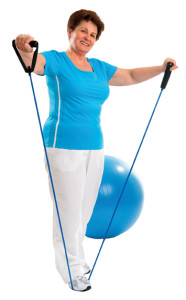Be wise when you exercise.
Posted on April 30, 2015 by bob in In Every Life
Warmer weather can motivate going outdoors and increasing activity. Although healthcare provider approval for beginning exercise programs is recommended, individuals often do not consider increased activities that occur with change in seasons as beginning an exercise program. However, physical inactivity diminishes cardiovascular function in even healthy adults. Sudden changes from a more sedentary lifestyle during colder weather can pose a threat for cardiovascular, respiratory, or muscle strain, or a risk for falls.
Some reminders can help to reduce these risks:
1. Keep appointments for routine checkups with your healthcare provider. Regular evaluation of your health status will  provide information to guide you in the level of activity that is prudent.
provide information to guide you in the level of activity that is prudent.
2. Be aware of your exertion level. Focusing on completing tasks can override awareness of increasing shortness of breath, fatigue, or even pain. Plan frequent rest periods after shorter periods of activity. Know your blood pressure and how it is affected by different levels of activity. Think about your level of breathing and other body functions. Stop if you feel your heart rate increasing, become dizzy, or perceive any type of headache. Try to have another person aware of your activity should difficulty arise. The saying “No pain, no gain” is NOT practical.
3. Be kind to your muscles. Stretch and warm up before activities to increase blood flow to your muscles. Overworked muscles can result in muscle strain or other injury. Remember to use larger leg muscles rather than back muscles for all lifting. Avoid any bending and twisting movements that can cause back injury. The term “weekend warrior” can refer to those who tackle chores or other activities without adequate preparation. Walking is a simple way to increase endurance. Gradual increase in muscle strength can be achieved through sitting exercises. The national health services provides a guideline for various activities that can be done while sitting. See http://www.nhs.uk/livewell/fitness/pages/sitting-exercises-for-older-people.aspx
4. Keep hydrated. Awareness of a thirst sensation decreases with aging, causing an increased risk for dehydration. Remember to drink fluid to replace body fluid lost through sweat and to help maintain your body temperature. If you have a fluid restriction due to a health condition, discuss needs for fluid replacement during activities with your healthcare provider. More information about hydration and health is available at http://www.ncbi.nlm.nih.gov/pmc/articles/PMC2908954/
5. Avoid injuries. Wear supportive shoes. Reduce fall risks by assessing the environment for unleveled ground or concrete surfaces. Identify and have repairs made to any potential hazards. Assure lighting is adequate and handrails are available at walkways or steps.
6. Manage any chronic conditions effectively. Discuss any monitoring that may be needed during increased activity with your healthcare provider. Examples include blood sugar levels, blood pressure, breathing difficulties, etc.
Think about your own needs as your activities increase with the changing seasons. Plan ways to enjoy your spring and take care of your health!
Arlene H. Morris, EdD, RN, CNE, is Professor of Nursing, Auburn Montgomery School of Nursing, and Immediate Past President of the AL State Nurses Association. Reach her at amorris@aum.edu.










